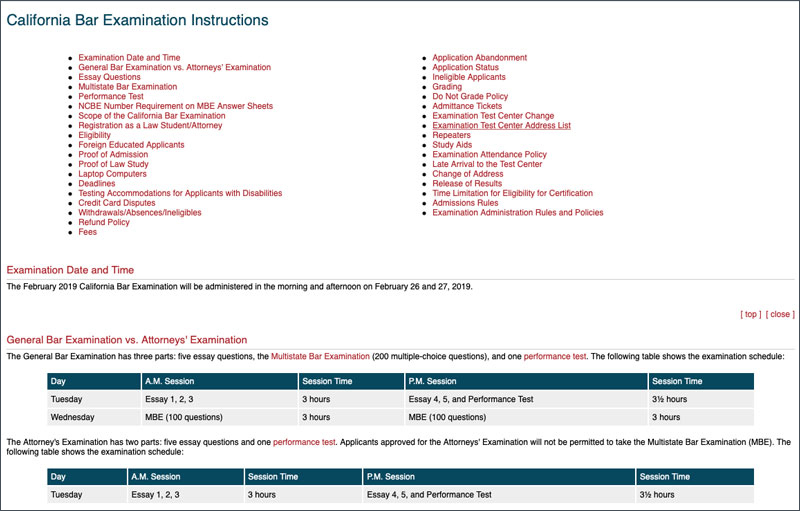By Steve Levin, BARBRI Vice President of International Development
Unless you’ve already taken a different U.S. bar exam, the California Bar Exam probably is unlike any exam you’ve ever taken in your life. It’s certainly more expansive than any exam you faced in law school and makes finals week look like child’s play.
Imagine preparing for finals in about 18 subjects (technically 16, but you have to know both the California rules and the federal rules for two of them). Challenging? You bet, but not impossible. Let’s go over some of the details of the exam to up your comfort level and help improve your outcome.

The Exam at a Glance
The California Bar Exam is a two-day exam comprised of three pieces:
- The MBE (Multistate Bar Exam): A 200-question multiple-choice test given in 2 three-hour sessions
- The PT (Performance Test): A 90-minute practical exercise in which you will be asked to do something a first-year lawyer might be asked to do using reference material containing all the information you’ll need to respond
- The California Essays: Five essay questions designed to be answered in one hour each (three in the morning and two in the afternoon, along with the PT) on any one or more of the following subjects:
- Civil Procedure
- Agency
- Constitutional Law
- California Civil Procedure
- Contracts (including Sales)
- California Evidence
- Criminal Law
- California Community Property
- Criminal Procedure
- Corporations
- Evidence
- Partnerships & LLCs
- Real Property
- California Professional Responsibility
- Torts
- Trusts
- California Wills
Issue Spotting
The essays present a few trouble spots for many students. The first involves issue spotting. Most of the questions are short — less than a page long, including the interrogatories at the end of the stories. But they are packed, and I mean packed, with issues. And while some exams hand you the issues “on a silver platter”, in many California questions you have to work just to figure out what the issues are.
For example, the following two interrogatories were in a past question:
- What challenges under the United States Constitution, if any, could Ivan reasonably raise to the dining hall quotations, and what is the likely outcome? Discuss.
- What challenges under the United States Constitution, if any, could Ivan reasonably raise to the denial of his requests for the book and the tea, and what is the likely outcome? Discuss.
Do you have any idea what is at issue? Note how the interrogatories say “what challenges” — as in, there could be (and on the California Bar, likely are) more than one. How much should you write? How many issues should you be looking for? When is enough, enough??
How will you know what issues to look for? Look at questions from previous exams and review answers addressing them. The California Bar Exam has been around a long time and there is not much new under the sun. What has been tested in the past is a pretty good indicator of what is likely to be tested in the future.
Formatting
The second stumbling block is formatting. How should answers be formatted? This is a trick question to some degree. Many students (and some instructors, too) think there is a magic formula, but there really isn’t.
The important thing to note is that the examiners want answers written in a “lawyer-like manner.” This is a logically written answer that sets out a conclusion and supports it by discussing the applicable law and the facts that lead to the conclusion.
Now you know issue spotting is important for your score, and analysis counts too. Be prepared to note what the issues are, tell the examiner what law controls, and state what facts are important in reaching whatever conclusion you reach. And, yes, you should reach a conclusion.

Timing
Another stumbling block for some students on the essay portion of the exam is timing. Students often run out of time. Despite how it may seem, each question is worth the same number of points. You really should be spending no more than one hour on any particular question and should avoid skipping questions of which you are unsure. This will keep time on your side.
BARBRI Has You Covered
To help you in your preparation, BARBRI selects California essays for practice that cover the issues most likely to arise on the bar exam. If you prepare with BARBRI and work through the practice essays assigned, you will have seen a majority of the issues that will appear on your essay exam and will be ready to conquer them.
Download the free BARBRI Bar Exam Digest for the latest exam information for each U.S. state.
About the author: Steve Levin has passed the bar exam in 10 U.S. jurisdictions with scores in the top 1% of the exam takers.